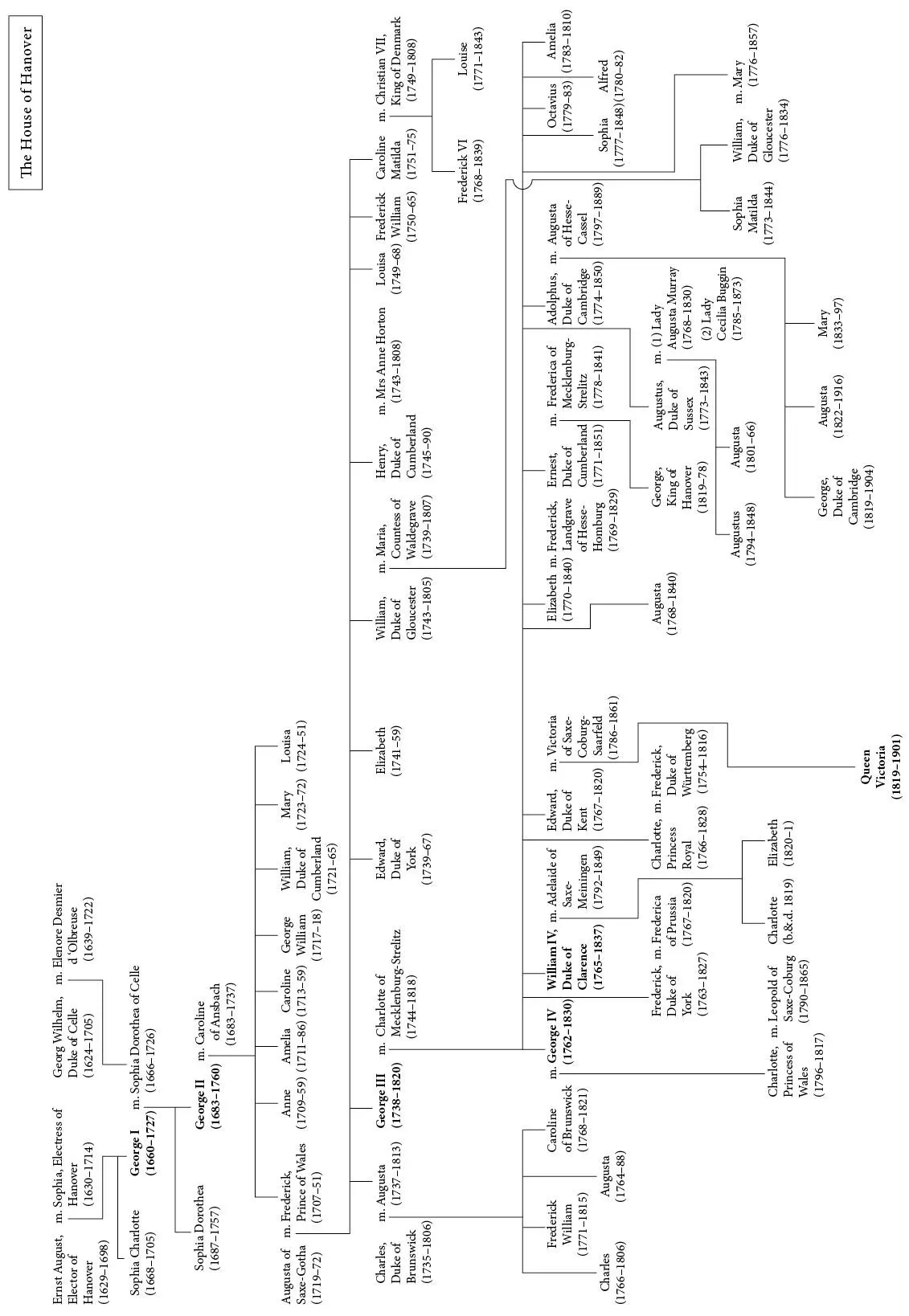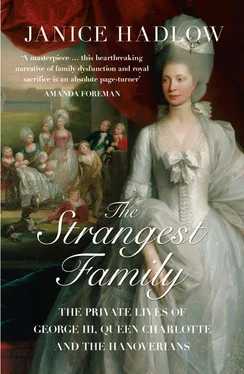As I hope this book shows, there were many good things that emerged from George’s genuinely benign intentions. But, as will also be seen, his vision imposed on his family a host of new obligations and pressures. George, Charlotte and their children were the first generation of royals to be faced with the task of attempting to live a truly private life on the public stage, of reconciling the values of domesticity with the requirements of a crown. The book’s title, The Strangest Family , partly reflects the opinions of close observers and indeed of family members themselves that among the royals were to be found some very distinctive, strong-willed and colourful characters; but it also recognises the paradox at the heart of modern monarchy. For most people, the family represents the most intimate and personal of spheres. For royalty, it is also the defining aspect of their public identity. The modern idea of monarchy owes far more to George III and his conception of the royal role than is often realised. His insight did much to ensure the survival of the Crown, linking it to the hearts and minds of the British in ways of which he would surely have approved. But, in other respects, his descendants still find themselves trying to square the circle he created, attempting to enjoy a family life defined by private virtues, yet obliged to do so in the unflinching glare of public scrutiny.
Although the experiences of George, Charlotte and their children are at the heart of this book, I have ranged beyond their stories to include those of their immediate forebears. It is impossible to appreciate what George III was attempting to achieve without understanding the moral world he sought so decisively to reject. In doing so, I was fascinated by the complicated marriage of George II and his wife Caroline (another clever Hanoverian queen), a stormy relationship coloured by passion, jealousy and deceit in fairly equal measure. Their hatred for their eldest son Frederick, operatic in its intensity, still makes shocking reading after so many years. I have also looked forward in time to include in some detail the story of George III’s only legitimate grandchild, Princess Charlotte. Hers is a sensibility very different from that of her predecessors: she was a young woman of romantic inclination, devoted to the works of Lord Byron and given to flirtations with unsuitable officers. The clash of wills between the young Charlotte and her grandmother, the queen, is one in which two very different interpretations of royal, and indeed female, duty collide, with an outcome as unexpected as it is touching.
I did not set out to write a book that ranged so far across the generations and included so many large and powerful personalities. I believe, however, that without that level of scale and ambition, it would be impossible to do justice to the story I wanted to tell. Besides, I have always loved a family saga. That is the narrative that dominates the diaries and correspondence that have been my window onto the reality of eighteenth-century lives. I have tried to use those sources to let the characters in this book speak, as far as possible, for themselves. I like it best when their voices are heard as clearly and as directly as possible. It will be up to the reader to decide if I have succeeded.
Bath, July 2014
‘But it is a very strange family, at least the children – sons and daughters’
SYLVESTER DOUGLAS, Lord Glenbervie, diarist
‘No family was ever composed of such odd people, I believe, as they all draw different ways, and there have happened such extraordinary things, that in any other family, public or private, are never heard of before’
PRINCESS CHARLOTTE, daughter of George IV
‘Laughing, [she] added that she knew but one family that was more odd, and she would not name that family for the world’
PRINCESS AUGUSTA, mother of George III

Prologue 
FORTY-FOUR YEARS AFTER THE EVENT took place that altered his life for ever, George III could still recall with forensic clarity exactly how it happened. On Saturday 25 October 1760, he had set off from his house in Kew to travel to London. He had not gone far when he was stopped by a man he did not recognise, who pulled a note out of his pocket and handed it to him. It was, George remembered, ‘a piece of coarse, white-brown paper, with the name Schroeder written on it, and nothing more’. He knew instantly what this terse and grubby communication signified. It was sent by a German servant of his elderly grandfather, George II; using ‘a private mark agreed between them’, it informed the young man that the old king was dying, and that he should prepare to inherit the crown. 1
To avoid raising alarm, George warned his entourage to say nothing about what had passed, and began to gallop back to Kew. Before he reached home, a second messenger approached him, bearing a letter from his aunt Amelia, the old king’s spinster daughter. With blunt punctiliousness, she had addressed it ‘To His Majesty’; George did not need to open it to understand that his grandfather was dead and that he had come into his inheritance. Amelia was probably the first person to call him by the title he would now bear for the rest of his life. With a similarly precise observation of the formalities, he signed his reply to her ‘GR’ – Georgius Rex. When he had set out for London that morning, he was the Prince of Wales, a young man of twenty-two embarking on a day of ordinary business, with no reason to suppose the life of perpetual anticipation and apprehension which he had endured since childhood was about to come to an end. The message contained in that ‘coarse, white-brown paper’ changed all that, turning him into the ruler of one of the most powerful nations in the world. ‘A most extraordinary thing is just happened to me,’ he scribbled breathlessly in a letter he wrote immediately after receiving the news. 2He was right. His long apprenticeship was over. He was king at last, and the mission for which he had been preparing himself for so many years could now begin in earnest.
*
The prospects for the new reign looked exceptionally bright. ‘No British monarch,’ the diarist Horace Walpole later declared, ‘has ascended the throne with so many advantages as George III.’ 3The new king was very fortunate in his timing. Had his predecessor died just a few years earlier, Walpole’s bullish optimism would have been inconceivable. Since the mid-1750s, Britain had been embroiled in a territorial struggle between the monarchies of Europe which, by 1756, had metamorphosed into a conflict of international proportions. During the Seven Years War, in North America, the Caribbean and India, the British fought the French in a clash of would-be global superpowers to establish strategic mastery over whole continents. Things started badly for the British, but with the appointment of the buccaneering William Pitt as first (later known as ‘prime’) minister in 1757, the tide was decisively turned. In the course of a year, the French surrendered valuable sugar-producing islands in the West Indies, lost the Battle of Quebec, which challenged their cherished pre-eminence in Canada, and saw their fleet decisively beaten by the Royal Navy at Quiberon Bay. It was hardly surprising that 1759 became known as ‘the year of victories’. As news of fresh triumphs continued to roll in, even the British themselves seemed somewhat taken aback by the scale and speed of their achievement. When the French capitulated at Pondicherry in 1761, which effectively forced them out of India, Walpole was not sure he could absorb any more success. ‘I don’t know how the Romans did, but I cannot support two victories every week.’ 4
Читать дальше














